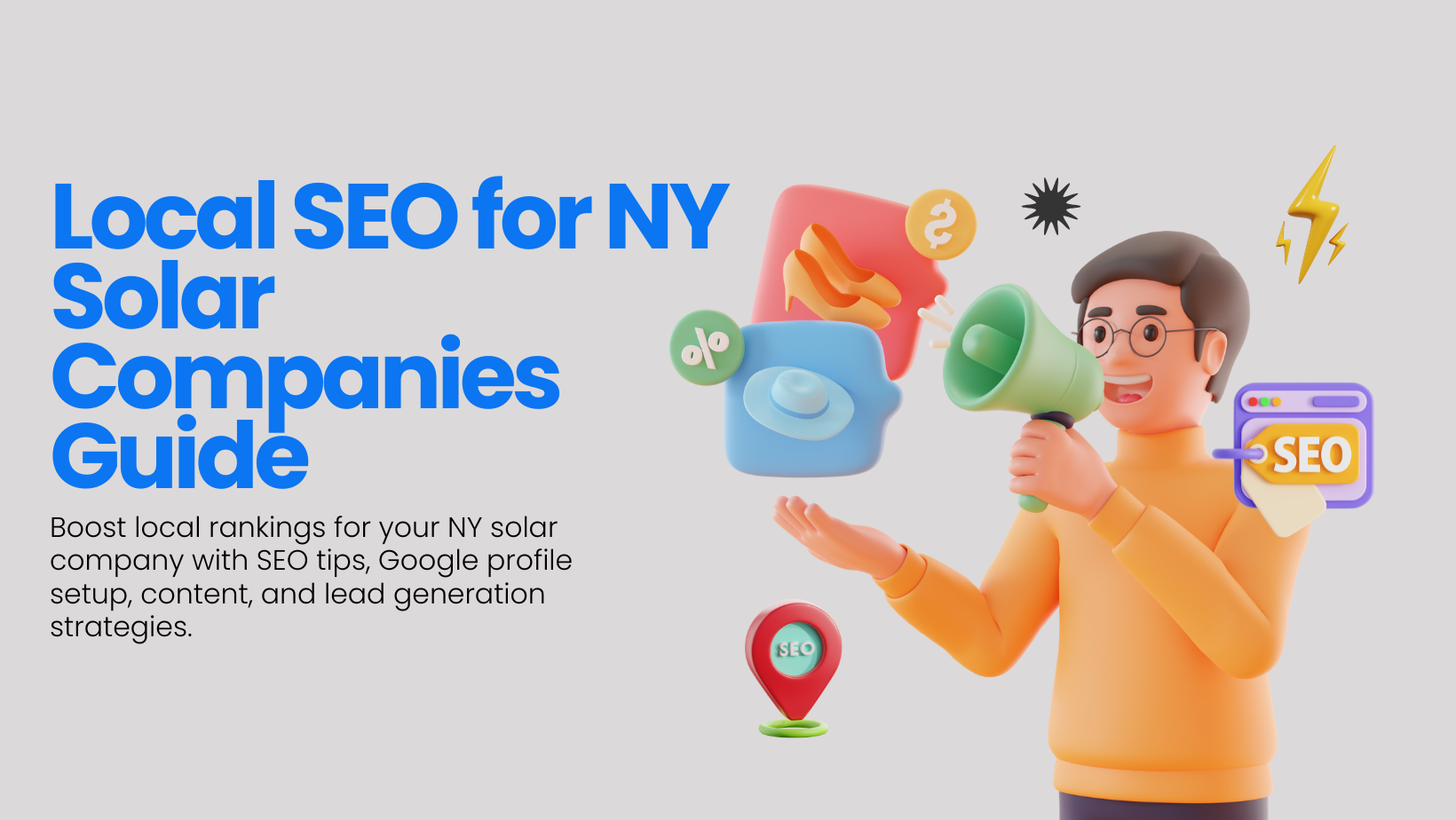
New York’s solar industry operates within a unique regulatory and geographic environment. The state’s Net Energy Metering program, NY-Sun incentive, and local utility rebates create significant opportunities for solar companies. However, these same incentives have attracted numerous competitors across the state’s diverse regions.
From densely populated boroughs in New York City to rural counties upstate, each area presents distinct customer demographics and search behaviors. Long Island homeowners might prioritize hurricane-resistant installations, while Albany businesses focus on commercial tax incentives. Understanding these regional nuances forms the foundation of effective local SEO.
Search patterns also vary significantly across New York’s geography. Urban customers often search for specific neighborhoods or zip codes, while suburban and rural customers cast wider geographic nets. Successful solar companies tailor their local SEO strategies to match these varied search behaviors.
Optimizing Google Business Profile for Solar Companies
Essential Profile Elements
Complete every section of your Google Business Profile with solar-specific information. Include detailed service descriptions that mention specific solar services like residential installations, commercial projects, battery storage, and maintenance. Add high-quality photos showcasing completed installations, your team at work, and before-and-after transformations.
Business hours should reflect your actual availability for consultations and emergency services. Many solar companies benefit from listing extended consultation hours, as homeowners often prefer evening or weekend appointments for solar assessments.
Leveraging Solar-Specific Categories
Select primary and secondary business categories that accurately reflect your solar services. “Solar energy equipment supplier,” “Solar energy company,” and “Electrical installation service” are common primary categories. Secondary categories might include “Energy equipment and solutions,” “Electrician,” or “Environmental consultant.”
Managing Customer Reviews
Positive reviews significantly impact local search rankings and customer trust. Develop a systematic approach to requesting reviews from satisfied customers. Send follow-up emails after successful installations, include review requests in project completion packets, and train your sales team to mention reviews during positive customer interactions.
Respond professionally to all reviews, including negative ones. Address specific concerns raised in critical reviews and demonstrate your commitment to customer satisfaction. This public engagement shows potential customers how you handle issues and builds trust in your brand.
Keyword Research for New York Solar Companies
Geographic Keywords
New York solar companies should target keywords that combine their services with specific locations. Examples include “solar installation Manhattan,” “solar panels Westchester County,” or “commercial solar Syracuse.” Create separate landing pages for each major service area to capture these location-specific searches.
Long-tail geographic keywords often have less competition and higher conversion rates. Phrases like “best solar company in Nassau County” or “affordable solar panels Long Island” attract customers further along in their research process.
Service-Specific Keywords
Target keywords that reflect the full range of your solar services. Beyond basic installation terms, consider keywords related to solar financing, battery storage, solar maintenance, and system monitoring. New York’s net metering program creates opportunities for keywords like “solar net metering NY” or “sell solar power back to grid.”
Commercial solar companies should target business-related keywords such as “commercial solar tax credits NY,” “warehouse solar installation,” or “manufacturing facility solar panels.”
Seasonal and Trending Keywords
Solar search patterns often follow seasonal trends. Spring keywords might focus on home improvement and energy savings, while winter searches could emphasize heating cost reduction. Stay current with New York energy policy changes, as new incentives or regulations can create temporary keyword opportunities.
Creating Location-Specific Content
Neighborhood and City Pages
Develop dedicated pages for each service area that go beyond basic contact information. Include details about local solar incentives, utility company programs, and area-specific installation considerations. For example, a page targeting Brooklyn might discuss Con Edison’s interconnection process, local permitting requirements, and neighborhood-specific installation challenges.
These location pages should feature customer testimonials from each area, local project photos, and information about community involvement or partnerships.
Local Solar Incentive Guides
New York offers numerous solar incentives that vary by location and utility company. Create comprehensive guides explaining federal tax credits, state incentives, utility rebates, and local programs. Update these guides regularly as incentive programs change.
Consider creating calculators or tools that help customers estimate their potential savings based on their specific location and utility company. Interactive content tends to rank well in search results and provides genuine value to visitors.
Case Studies and Project Showcases
Develop detailed case studies featuring local installations. Include information about system size, equipment used, installation challenges, customer savings, and project timelines. Use local landmarks or neighborhood references to reinforce geographic relevance.
Before-and-after photos, customer interviews, and detailed project specifications make these case studies valuable for both SEO and sales purposes.
Technical SEO for Solar Websites
Site Speed and Mobile Optimization
Page loading speed significantly impacts both search rankings and user experience. Solar company websites often feature high-resolution installation photos and detailed product information that can slow loading times. Optimize images, leverage browser caching, and consider content delivery networks to improve performance.
Mobile optimization is particularly important for local searches, as many customers search for solar companies while on-the-go or during home improvement research sessions. Ensure your website provides an excellent experience across all device types.
Schema Markup
Implement local business schema markup to help search engines understand your company’s location, services, and contact information. Solar companies can also benefit from service schema, review schema, and FAQ schema markup.
Consider implementing solar-specific structured data for things like system specifications, warranty information, and financing options.
Local Landing Page Structure
Create a logical site structure that supports your local SEO efforts. Use clear URL structures that include location and service keywords. For example:
Internal linking between location pages and service pages helps search engines understand the relationship between your services and service areas.
Building Local Citations and Links
Industry-Specific Directories
Submit your business information to solar industry directories, clean energy organizations, and renewable energy associations. The Solar Energy Industries Association (SEIA), NY Solar Energy Society, and local green business directories provide valuable citation opportunities.
Ensure consistency across all citations, including business name, address, phone number, and website URL. Inconsistent information can hurt local search performance.
Local Business Partnerships
Develop relationships with complementary local businesses such as roofing companies, electrical contractors, and home improvement retailers. These partnerships can lead to referral traffic, backlinks, and joint marketing opportunities.
Consider partnering with local environmental organizations, sustainability groups, or clean energy advocates. Speaking at local events or participating in community sustainability initiatives can generate valuable local links and brand awareness.
Content Marketing for Link Building
Create valuable content that other local websites want to link to. Solar savings calculators, local incentive guides, and educational resources about solar energy can attract links from local news sites, municipal websites, and community organizations.
Guest posting on local business blogs, contributing to community publications, and participating in local podcast interviews can also generate relevant backlinks.
Tracking and Measuring Local SEO Success
Local Search Rankings
Monitor your rankings for target keywords in the specific geographic areas you serve. Track both general solar terms and location-specific phrases. Many SEO tools allow you to specify geographic locations for more accurate local ranking data.
Pay attention to your Google Business Profile performance, including search impressions, website clicks, and direction requests. These metrics indicate how often potential customers find and engage with your business through local search.
Lead Generation Metrics
Track leads generated through local search channels. Implement call tracking numbers on local landing pages, monitor form submissions by traffic source, and survey new customers about how they found your company.
Calculate the conversion rate and customer value for local search traffic to understand the ROI of your local SEO efforts.
Competitive Analysis
Monitor your competitors’ local SEO performance to identify opportunities and threats. Track their Google Business Profile activity, review acquisition, and local content creation efforts.

Understanding your competitive landscape helps you identify gaps in your own local SEO strategy and capitalize on areas where competitors may be underinvesting.
Maximizing Your Solar Company’s Local Presence
Success in New York’s competitive solar market requires a comprehensive approach to local SEO. By optimizing your Google Business Profile, creating location-specific content, building local citations, and tracking performance metrics, your solar company can capture more qualified leads from local search.
The key lies in understanding that local SEO is an ongoing process, not a one-time effort. Search algorithms evolve, competitors adjust their strategies, and customer behavior changes over time. Solar companies that consistently invest in local SEO optimization will build sustainable competitive advantages in their service areas.
Start by auditing your current local SEO performance, then systematically implement the strategies outlined in this guide. Focus on providing genuine value to your local community while optimizing for search engines, and you’ll build a local presence that drives consistent, qualified leads for your solar business.
Leave a Reply